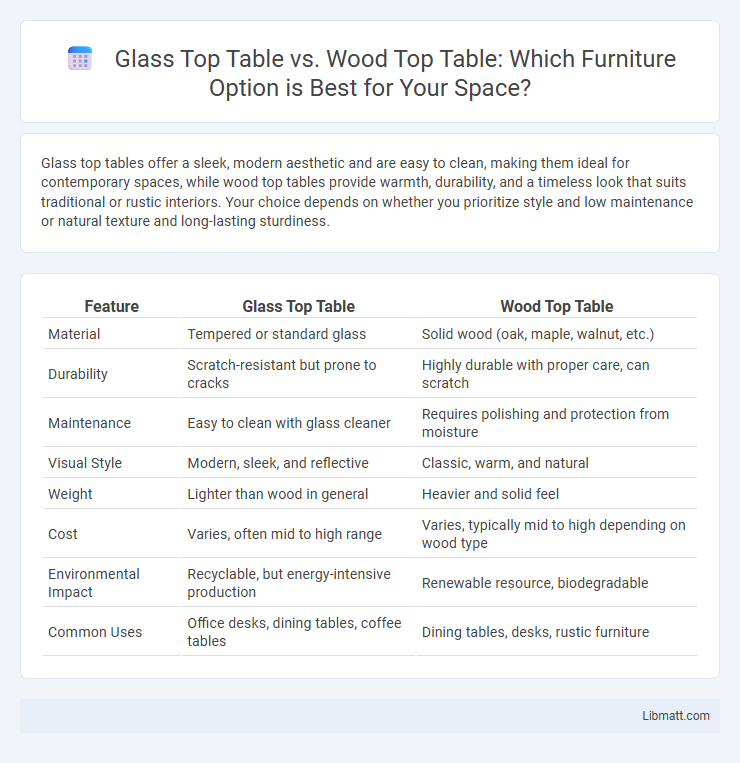Glass top tables offer a sleek, modern aesthetic and are easy to clean, making them ideal for contemporary spaces, while wood top tables provide warmth, durability, and a timeless look that suits traditional or rustic interiors. Your choice depends on whether you prioritize style and low maintenance or natural texture and long-lasting sturdiness.
Table of Comparison
| Feature | Glass Top Table | Wood Top Table |
|---|---|---|
| Material | Tempered or standard glass | Solid wood (oak, maple, walnut, etc.) |
| Durability | Scratch-resistant but prone to cracks | Highly durable with proper care, can scratch |
| Maintenance | Easy to clean with glass cleaner | Requires polishing and protection from moisture |
| Visual Style | Modern, sleek, and reflective | Classic, warm, and natural |
| Weight | Lighter than wood in general | Heavier and solid feel |
| Cost | Varies, often mid to high range | Varies, typically mid to high depending on wood type |
| Environmental Impact | Recyclable, but energy-intensive production | Renewable resource, biodegradable |
| Common Uses | Office desks, dining tables, coffee tables | Dining tables, desks, rustic furniture |
Introduction: Glass vs Wood Tabletops
Glass tabletops offer a sleek, modern aesthetic with reflective surfaces that enhance natural light and create an open feel in any room. Wood tabletops provide warmth and durability, showcasing natural grain patterns that add character and timeless appeal to furniture. Choosing between glass and wood tops depends on desired style, maintenance preferences, and the intended use environment.
Aesthetic Appeal: Modern vs Classic Looks
Glass top tables offer a sleek, modern aesthetic with their transparent surfaces that create an airy, spacious feel perfect for contemporary interiors. Wood top tables provide a warm, classic look featuring rich textures and natural grains that complement traditional or rustic decor styles. Your choice between glass and wood tops will significantly influence the room's ambiance, balancing modern minimalism against timeless elegance.
Durability and Longevity Comparison
Glass top tables typically offer excellent resistance to stains and scratches but can be prone to chipping or cracking upon impact, impacting their long-term durability. Wood top tables, especially those made from hardwoods like oak or maple, provide superior longevity due to their ability to withstand heavy use and be refinished multiple times. Both materials require proper maintenance, but wood tops generally endure longer in high-traffic environments due to their robust and repairable nature.
Maintenance and Cleaning Requirements
Glass top tables require regular cleaning with non-abrasive glass cleaners to maintain their shine and prevent streaks, while fingerprints and smudges are more noticeable, necessitating frequent wiping. Wood top tables demand periodic dusting and the use of wood-specific polish or oil to preserve the surface and prevent drying or cracking, with attention to avoid water stains or heat damage. Both surfaces benefit from prompt spill cleanup to avoid permanent damage, but glass is generally easier to sanitize and less prone to staining compared to wood.
Cost and Affordability Factors
Glass top tables typically range from $150 to $600, offering a modern aesthetic with varying thickness and edge finishes affecting price. Wood top tables vary widely, from $200 for basic pine to over $2,000 for premium hardwoods like oak or walnut, influenced by wood type and craftsmanship. Budget-conscious buyers often find glass tops more affordable initially, while wood tables provide durability and potential long-term value despite higher upfront costs.
Safety Considerations for Homes
Glass top tables offer a sleek aesthetic but require safety measures such as tempered glass to prevent shattering and injuries, making them less ideal for homes with young children or pets. Wood top tables provide sturdiness and durability with natural resistance to impacts and minimal risk of sharp edges, enhancing household safety without extensive precautions. Choosing a wood top table often ensures safer long-term use due to its solid construction and lower likelihood of causing accidents.
Versatility in Interior Design
Glass top tables offer sleek, modern aesthetics that complement minimalist and contemporary interior designs, reflecting light to create a sense of openness and spaciousness. Wood top tables bring warmth and natural texture, fitting seamlessly into rustic, traditional, or eclectic decor styles while providing durability and timeless appeal. Your choice depends on whether you prioritize a light, airy feel with glass or a cozy, organic atmosphere with wood.
Environmental Impact and Sustainability
Glass top tables often have a lower environmental impact during production because glass is recyclable and can be reused multiple times without loss of quality. Wood top tables rely on renewable resources, but sustainability depends heavily on sourcing from responsibly managed forests or using reclaimed wood to minimize deforestation. Your choice between glass and wood should consider not only durability and aesthetics but also the lifecycle impact, including production emissions, recyclability, and end-of-life disposal.
Weight and Ease of Mobility
Glass top tables are typically heavier than wood top tables due to the density of tempered glass, making them less portable and harder to move without assistance. Wood top tables, especially those made from lighter woods like pine or plywood, offer easier mobility and can be relocated more comfortably by one person. If You prioritize flexibility in arrangement and frequent repositioning, a wood top table may be more suitable for Your needs.
Final Verdict: Which Tabletop Suits You Best?
Glass top tables offer a sleek, modern aesthetic and are easy to clean, making them ideal for contemporary spaces and those who prioritize low maintenance. Wood top tables provide warmth, durability, and timeless appeal, perfect for traditional settings and those valuing natural materials and longevity. The best tabletop depends on your lifestyle preferences: choose glass for a minimalist, stylish look and easy upkeep, or wood for a cozy, durable, and classic feel.
Glass Top Table vs Wood Top Table Infographic

 libmatt.com
libmatt.com